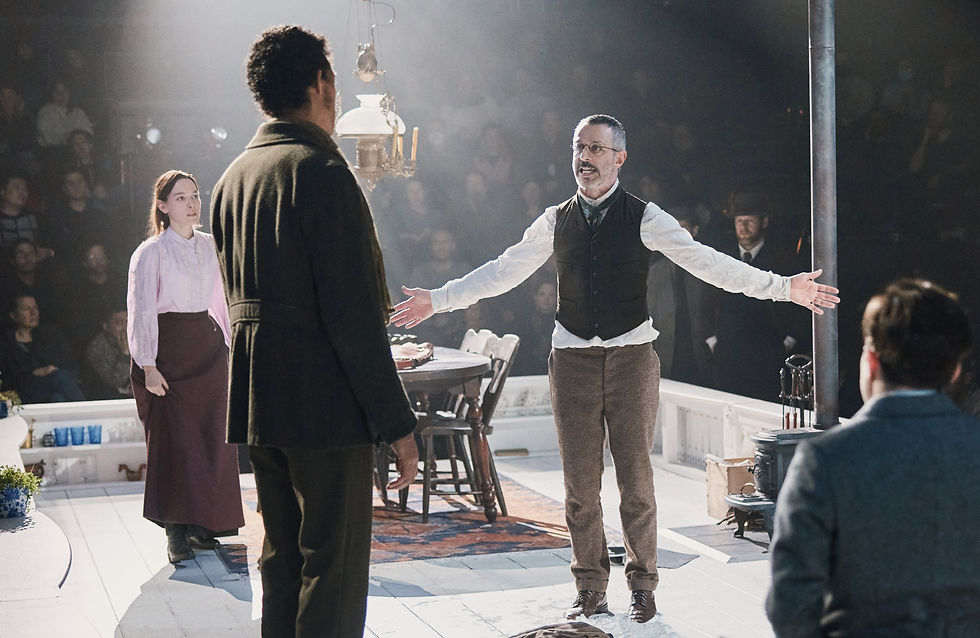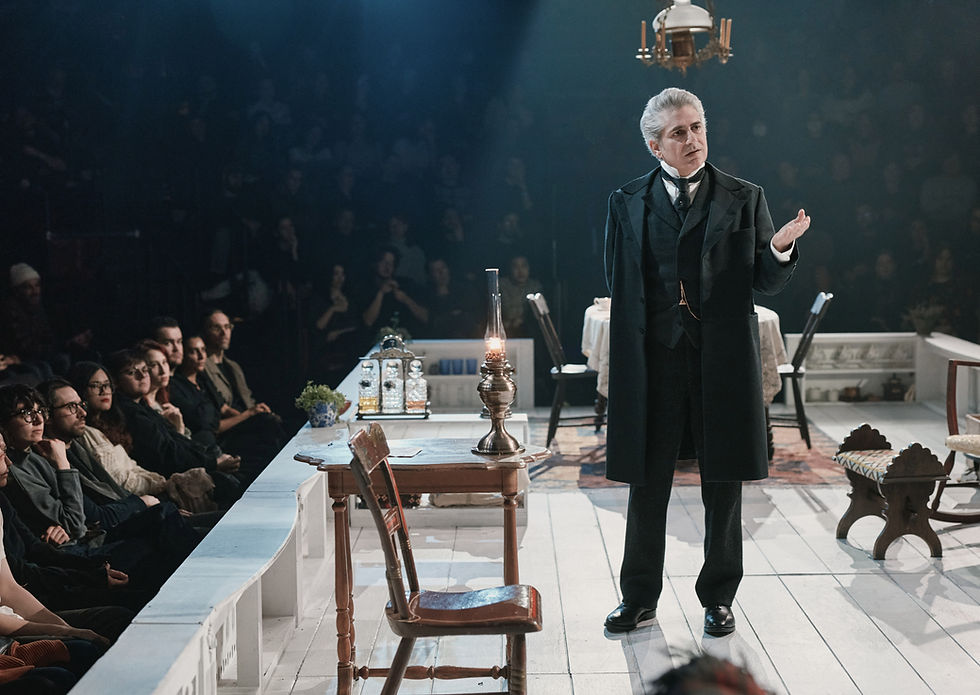Who's Afraid of Thomas Stockmann?
- Jonathan Kalb
- Apr 1, 2024
- 5 min read

The last time Ibsen’s An Enemy of the People (1882) made a big splash in New York was in 2013, when the German director Thomas Ostermeier brought his modernized Schaubühne production to BAM. There’s a long tradition of turning up the house lights and folding audiences into the action of this famous play, because its climax is a violent mob reaction prompted by a public address. In case anyone needs reminding, Ibsen’s protagonist, Dr. Thomas Stockmann, has discovered contamination in the water of his popular spa town that would cost a fortune to clean up, and when he tries to speak publicly about it in Act 4, all his supposed friends and liberal allies show up to silence him and incite the crowd against him.
At BAM, audiences were cheekily invited during Act 4 to pipe up and gripe about whatever was on their minds, whether relevant to the play or not. Stockmann had just helpfully modeled such scattershot griping by taking the floor to complain not about pollution, or obsolete ideas, or local corruption, as in Ibsen, but rather about “the imminent collapse of capitalist culture.” (He read from a rambling 2007 anarchist manifesto called “The Coming Insurrection” by the anonymous French group The Invisible Committee, which wasn’t mentioned in the program!) The night I attended, the audience’s gripes after that included mild indignation about the price of the BAM tickets, Michael Bloomberg’s plutocratic perfidy, and the vexations of New York City’s new bike lanes.
It's a relief to report that the new version of Enemy of the People just opened on Broadway—starring Jeremy Strong and Michael Imperioli and directed by Sam Gold—is actually a sincere and intelligent effort to grapple with Ibsen’s play. It’s much more coherent, engaging, politically provocative, and therefore enlightening than Ostermeier’s. It too includes direct address to the audience with the house lights on, but not in a gratuitous way. I did not, alas, witness the impromptu disturbance of this show during Act 4 by the climate protest group Extinction Rebellion several weeks ago. But I do think the show itself ought to qualify as a political disturbance in the same vein. What, after all, is more searingly political than performing this work’s horrific climax—a crowd-driven deliberate denial of truth played against the emotional overreaching of a crusading truth-teller—in a plausible and gripping way?
Amy Herzog’s script is particularly impressive. Her slimmed-down yet utterly faithful and pungent adaptation solves scores of problems (longwindedness, countless superfluous, melodramatic mini-tensions) in the original script. Her text is less than half as long as Ibsen’s, yet misses nothing essential in the action. The thankless roles of Dr. Stockmann’s wife and young sons have been cut, but even more decisive is the thinning and distilling throughout. As she showed in her equally sleek and efficient version of A Doll’s House, performed last year on Broadway, Herzog has a keen sense of how savvy we’ve all become about story and character tropes in the Netflix age, able to grasp details of emotion, motivation, and action in a phrase or two that once took pages to convey.
Act 4 is her most accomplished feat of compression, steering right to the heart of the public confrontation without bothering with preliminaries. (Gold uses the arena configuration of Circle in the Square powerfully in this section, placing Strong atop a bar just used to serve the audience free drinks, so he’s free to turn in every direction to address us.) Interestingly, the script also uses language here that highlights parallels to Covid and Anthony Fauci without seeming to stretch or strain. Hovstag, for instance, the recently revolutionary newspaperman who now fears loss of subscribers, speaks of depriving the doctor of a “platform” to spread his “unproven science.” Stockmann then harangues the crowd with a speech that could be about Fox and social media algorithms:
Don’t rule out the possibility that with new information, you could change your minds. You don’t have to think their thoughts, you can think your own. In fact they’re just trying to guess your thoughts before you have them and it’s a vicious cycle where all originality is extinguished, where the public discourse is reduced to an airless, mindless regurgitation of other people’s ideas, where you all behave like sheep – baaaa! Baaaaa!
Then there is Jeremy Strong, who makes a downright fascinating Stockmann. As you’d expect, he’s earnest and direct but carries a whiff of self-regard, particularly when mingling with working people. His Stockmann is perfectly respectful but also utterly blind to the social effects of his zealous single-mindedness. Imagine a sad professor who, knowing he’s right, moons about wondering why everyone else doesn’t just agree with him—that’s the flavor. But an equally crucial ingredient is the inescapable shadow of Kendall Roy. The overprivileged faker and half-educated middlebrow Strong played so brilliantly for six years in Succession dogs the Ibsen character here, as Stockmann is the opposite of a middlebrow. He’s a bootstraps professional whose deep, hard-earned knowledge is trashed by his friends and neighbors because his facts are inconvenient. It’s as if the sins of Kendall somehow contribute to Thomas’s destruction in 2024.
Another remarkable performance is Thomas Jay Ryan’s portrayal of Aslaksen, the printer who also chairs the local Property Owners Association and temperance league. In Ibsen, this is an easily overlookable role, often played as a humble artisan who’s caught unawares by the water-contamination scandal, a limited intellect pushed out of his comfort zone. In Ryan’s hands he becomes a calculating, bare-faced hypocrite who knows exactly what he’s doing in helping to discredit Stockmann. The treachery goes hand-in-hand with his self-satisfied, petit-bourgeois complacency. It’s people like Ryan’s Aslaksen who make democracy the ordeal it so often is.

The one key performance in the show I wish were a bit more nuanced is Michael Imperioli’s as Peter Stockmann, the town’s mayor and Thomas’s brother. Imperioli is famous, of course, for playing a gangster on The Sopranos, and here he is one again. There’s nary a trace of brotherly affection between him and Thomas. Nor is there any development: his Peter is exactly the same stiff, puritanical, skinflinty authoritarian at the end he is at the beginning. That unfortunately drains the confrontation with Thomas of variety and suspense. It’s possible this performance will grow more layered over the course of the run. I hope so.
It is in any case a small blemish on a generally dazzling creation. Yes, I know tickets are hard to find for this production, but at a time when the lie-machines around us are revving up to grind down truth on an industrial scale again, you should make an extra effort.
Photos: Emlio Madrid
By Henrik Ibsen
A New Version by Amy Herzog
Directed by Sam Gold
Circle in the Square




Comments